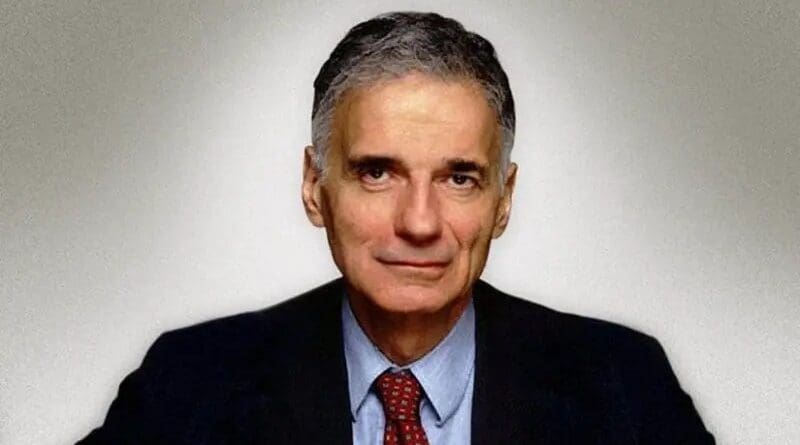Ralph Nader: Needed An Educational Institute To Extend Dick Gregory’s Legacies – OpEd
By Ralph Nader
On hearing about the loss of Dick Gregory, at age 84, political analyst and former White House counsellor Bill Curry said, “He was the first successful black comedian who insisted on having opinions.”
Until Dick Gregory—with his pioneering, satiric, audacious humor on stage and on national TV, which made white audiences laugh their way into reality—African-American comedians were expected “to do minstrel skits in baggy pants and outsize shoes and use slapstick humor,” in the words of Mel Watkins, author of On the Real Side: A History of African American Comedy.
Breaking through the national media in the early 1960s—from Time Magazine to the famous Jack Paar’s TV show, Tonight—Dick Gregory showed America that he could connect comedy with a myriad of important social justice causes even at the expense of his career.
Watkins describes Gregory well: “He was sharp. He was urbane. He smoked a cigarette onstage. He was very calm in demeanor but very outspoken in what he said… He brought in current political and social issues into his comedy—which was astounding to most white Americans at that time. It was during a time when blacks were considered incapable of doing this.”
Before an audience of white southern business executives, he hit at segregation, saying “I know the South very well. I spent 20 years there one night.” Unruffled by hecklers shouting racial epithets at one night club, he responded calmly that his contract with the club stipulated a $50 bonus each time someone used ‘the N word’ and invited the audience to keep on saying it. Moreover, he titled his 1964 memoir, Nigger: An Autobiography—coauthored with Robert Lipsyte—so that every time the slur was spoken, it was advertising the book which became a bestseller.
In a 2000 interview with NPR, a serious Dick Gregory said this about ‘the N word’: “Let’s pull it out of the closet, let’s deal with it, let’s dissect it. It should never be called ‘the N word.’”
One of his classic jokes that showed his wit, timing and imagery went like this: He walked into a restaurant in the segregated South where a waitress declared “We don’t serve colored people here.” Mr. Gregory replied: “That’s alright, I don’t eat colored people. Just bring me a whole fried chicken.”
But the former high school and college track star, Army veteran and father of 11 children was much, much more than a searing comedian whose humor exposed deeper truths behind inhuman conditions around the country and the world. No one showed up at more rallies, demonstrations, pickets, conducted more fasts, was arrested for non-violent protests more times—sometimes beaten and spat upon—over half a century, than this wiry, bearded advocate for a world without malice and hate.
The last time I saw Dick Gregory was in 2014. We were participating in a rally for D.C. statehood with Mayor Vincent Gray. I came to the stage and tapped him on the shoulder saying, “Mr. Gregory, is this your first protest?” He turned around and, for an instant gave me a a quizzical, speechless expression, before we both broke out laughing.
In a long, front-page obituary recognizing his impact, the New York Times’s Clyde Haberman writes: There seemed few causes he would not embrace. He took to fasting for weeks on end, his once robust body shrinking at times to 95 pounds. Across the decades, he went on dozens of hunger strikes, over issues involving the Vietnam War, the failed Equal Rights Amendment, police brutality, South African apartheid, nuclear power, prison reform, drug abuse and American Indian rights.” His commitment to civil rights did not keep him from being an opponent of all injustices, such as mass hunger and lack of universal access to health care.
Indeed, Mr. Gregory battled on all possible fronts. In 1967 he ran for Mayor of Chicago to challenge longtime Mayor Richard J. Daley for his harsh crackdown on peaceful protesters. A year later he traveled the country running for President against Richard Nixon. He joined causes with John Lennon, and In 1980 he went to Tehran to try and free the U.S. Embassy officials being held by the new revolutionary regime that toppled the U.S.-backed dictator. He fasted down to 97 pounds before being compelled to leave the country.
Amidst increasingly trivial and frivolous (and not a little ageist) mass media, his formerly publicized fasts were increasingly ignored as were his other activism and actions. Unfazed, Dick Gregory became a five-day-a-week popular presence on the college campus lecture circuit and continued putting out albums and writing books.
Along with the white comics Lenny Bruce and Mort Sahl, Mr. Gregory was all about breaking taboos, defying stereotypes and combatting entrenched modes of oppressive power.
Unlike other high-profile comedians, Dick Gregory refused to deliver profanities or obscenities to get his points across or to provoke his audience’s attention. He was unique, using current events and social tensions to fuel his incisive imagination.
He still has millions of fans, most of them now over 45 and some with ample discretionary income, not to mention the affluence of the leading comics for whom he paved the way. Can a determined core of Gregory devotees organize to start a Center or Institute in his name to extend his examples of civic courage, remarkable communication skills, and the combination of humor and steadfast seriousness that induce people to listen and open their minds? Our tense, manipulated society needs the kind of clean, contemporary new satire that such an Institute, among other purposes, can engender with a new generation of comedians showing that “in humor there is truth.”

